When I walk into the private room in a members’ club in Soho where I’m supposed to interview Jarvis Cocker, a man in a suit with greying hair is standing with his back to me, writing something on a flip chart. My heart sinks; the room has obviously been double-booked for someone else’s business meeting. Except he then turns around slowly, grinning as enigmatically as a new teacher at Hogwarts, and it is Jarvis Cocker, and he has written WELCOME TO THE INTERVIEW in orange marker pen.
Fortunately, we are here not to calculate quarterly earnings on a spreadsheet, but to discuss caves, because Jarvis has become a bit obsessed with them, having taken his son Albert, 16, on holiday to his mum’s house outside Sheffield, “looking for something to do, and the nearest place to visit was Creswell Crags”. Therein, the Cockers learned that our ancestors might have tried to create pleasing sounds and rhythms deep beneath the earth, too, giving a whole new meaning to underground music, and Jarvis suddenly realised that contemporary musicians might enjoy using echo and reverb effects so much because of a kind of spirit memory of it coming into our bodies from the very rocks themselves. “I felt profoundly moved by it,” he says.
Cocker is interested in the effects on us of forces unseen. “People don’t pay so much attention to the unconscious any more, things are very conscious, but that’s where all this stuff lurks – and that’s why we end up with Trump. You know the fatberg that was found in London sewers? All of that disgusting dark cesspit, all the slime and crap that we try not to think about? That’s Donald Trump.”
So he has written a song called Must I Evolve? In it, he, or at least his character, asks if he really has to keep changing, progressing, maturing, and a chorus of other voices reply that yes yes, he must. It is set in a figurative cave and was recorded in a real one, when he and his new band, JARV IS…, played a gig in Peak Cavern, Derbyshire, last year. The song is also about a couple who stagnate, with Cocker having always liked to describe everyday matters in his songs, but “to try and see them in a mythic context. So to look at a relationship as the development of human civilisation.” He laughs at his own boldness. “So in the song we’ve moved into the cave together, discovered fire, painting – and then we flash forward, detour to a rave off the M25.”
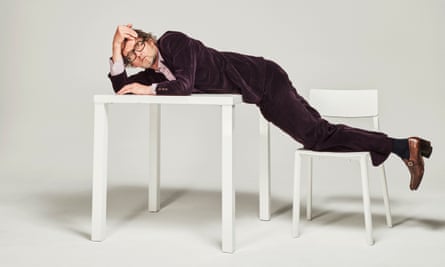
I wonder if it is a continuation of Pulp’s hit, Sorted for Es and Wizz, two decades ago, in which he danced all night at a rave and left part of his brain in a field in Hampshire. Surely that was what the rave scene was all about – an urge to reconnect with the cave, with something more primal.
“It was, yeah, it was primal. You would see people really in trance-like states. And obviously drugs were kind of involved.” I make a less-than-credulous face at his “kind of,” but he persists. “You know, drugs can only really bring something out of a person that’s already there, or amplify it.” The rave mentioned in the new song took place “in an escape tunnel under the M25. You know, the ones they build that are tall enough to stand up in, but they’re to let badgers and, I guess, small deer, out.”
This is it, I think, the zenith of British popular culture has been reached: Jarvis Cocker dancing in a tunnel with a badger.
“And I remember walking down this tunnel, away from the speakers and thinking I was walking back in time. One guy had dropped his drugs in the long grass so he was sifting through it with his fingers and in my altered state I thought I was seeing Neanderthal men trying to find grubs to eat. It was the strangest partying experience I’ve ever had and it always stuck with me. Stalactites take a long time to form, don’t they?”
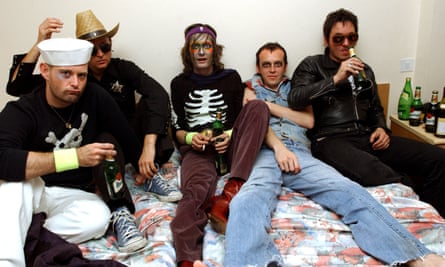
Cocker speaks quite slowly and ponderously, and has a very sweet habit of finishing a thought and then looking up at you, smiling like a child who is pleased to see an ice-cream van. We discuss the artist Jeremy Deller’s recent film Everybody in the Place, in which he shows rave footage to contemporary schoolchildren, who can’t believe that “people allowed themselves to be so free, because now somebody would film you on their phone and you’d be embarrassed. You know how you always think kids are wilder than their parents? Maybe it’s the first time I’ve seen that that’s really changed now. People are more self-conscious and they’ve got an obsession with control. But sometimes just giving up control is really pleasant.”
Cocker has been writing a book about creativity, called This Book Is a Song, and it has made him more aware of the levels of control society now holds on people. He says he is “really aware that I was super fortunate” to go to art school at a time when things were financially and socially freer, and his sister’s kids, who are grown up, “both might have gone to art college, but they didn’t, because it costs money now. I think that’s a drag. Education has turned into a bit of a racket. Artistic creation is a shared part of human heritage, everybody can do it, but it’s basically disappeared from the school curriculum, so then it becomes pretty much impossible to go to college if you’re from a certain social sector. So you’re cut off from something that is your birthright. Understandably, people don’t want to get into debt for a course without knowing they’ll get a job at the end of it, but art’s not really about that. It’s about teaching you how to think in a creative way; how to look at the world and use it as raw material. But nobody’s going to look at an art degree and say: ‘Well that sounds like it’s worth 60 grand.’”
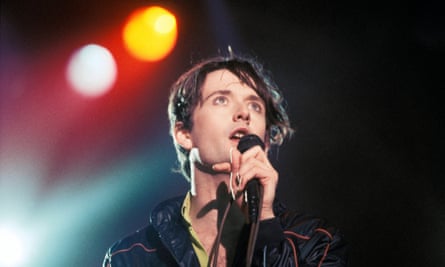
He recently met someone who studied at the new Central Saint Martins, after its relocation to King’s Cross, “and one thing I found dispiriting about what she was saying was that you’ve got these electronic passcards to get in. If you’re doing a fashion degree, your card will only get you into the relevant part of the building for your degree, you can’t get into sculpture on the other floor. Whereas I think the dialogue between them is kind of the point. My degree was in filmmaking, but I went and did sculpture for a couple of weeks, which is where I met the girl who inspired the Common People song. She was doing the same thing, she wasn’t actually on the sculpture course either. And it was seen as a good thing that you would go and stimulate your brain in a different way and, who knows, that might somewhere down the line produce something.”
Such as one of the biggest-selling records of the 1990s, for example, a world hit that brought far, far more than 60 grand into the British economy – you’d think our politicians would notice. I ask him, if he took power tomorrow (he interrupts to say: “Well obviously I will be doing so very soon”), he’d abolish tuition fees, and he says yes.
Cocker has also been very vocal in the anti-Brexit movement. “I think Brexit has been an ongoing mental health crisis for the whole country. With it being a split vote, you’re kind of pitching half the country against the other. In the past people always accepted the fact that while you might not agree with everybody, it’s more important to just get on with them. But now it’s everybody screaming at each other: ‘Ooh I’m not talking to her!’ It’s very pertinent in my life, because my mother voted for Brexit, so what am I gonna do, am I gonna disown her?” He adopts a petulant theatrical voice: “You Are Not My Mother Any More!” He went home for Christmas and Easter “and Brexit was banned as a subject of conversation at both”.
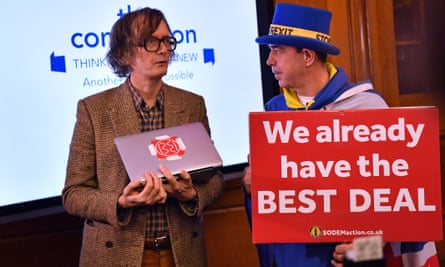
Having spent much of the past 20 years living half the time in Paris, where his son is based with his ex-wife, French fashion stylist Camille Bidault-Waddington, Cocker notes that this British obsession with losing our identity hasn’t happened on the continent. “The French aren’t any less French for being in Europe; the Germans aren’t any less German. And they have the euro.”
I ask how he has juggled fatherhood with being a pop star and he pauses, so I explain I want to ask him this partly because it’s a question that only ever gets asked of famous women in interviews, never of men. “No no, and I want to answer it, I want to,” he says, carefully, “that’s why I’m giving it some thought. I do feel like becoming a father has had a fundamental and profound effect on me.”
He says he has photos of his baby son asleep in a guitar case, “sleeping backstage while we did a show, because we forgot to bring a crib. I think it’s good for kids to see what you do in your own life, to involve them in it.” But he says he also does the mundane stuff, the school pick-ups, etc, “because I split up with the mother of my child quite early and it’s been a long time that he’s lived in separate households, so when I’ve got him, I have to do all that stuff.”
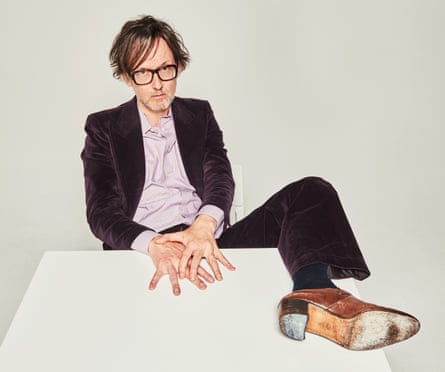
He beams with comic pride before revealing: “I can even cook about five different dishes now,” adding there is not a single M&S ready meal with which he and his son are unfamiliar.
The fatherhood question has really grabbed him, though. He says he subscribes to the “benign neglect” school of parenting, leaving his son to get on with his own interests, like his mother did with him. “I was never in any doubt my mother loved me.” He hasn’t tried to ban screentime or anything like that. “You can’t, can you? But as I think we’ve established in the course of this interview, I am someone who has lived in their head for most of their life and thought about things, conceptualised things and the good thing about parenthood is that it brings you to the present really, with a jolt. At first it’s just like, ‘How do I stop this creature from dying whilst in my care?’”
Cocker says you just suddenly have to realise that “your schedule, your priorities, don’t mean anything. That famous quote about the pram in the hallway being the enemy of creativity – I found it different from that, I found it good that it focused you, that if the baby took an afternoon nap, you had to get all your work done quickly. I remember the first time I took my son to a crèche. I only had two hours before I had to pick him up again, but I just thought, ‘What the fuck am I gonna do now?’ I was just so used to walking around with him in a pushchair going, ‘Ooh, now he’s hungry. Ooh now he’s crapped himself.’” He also enjoyed discovering he had instincts, “because as a parent you have that instinctual thing you’ve got to look after that other person. So it brings you to a really basic part of humanity.”
And with that, we seem to have returned to the cave and the rave. As I stand up to leave, Jarvis walks over to the flip chart and wonders aloud what message he should leave this meeting room. He writes: “The mystery is hidden in the cave.” Is it actually, I wonder – did he leave something at Peak Cavern when he played? “That,” he replies, all the guile and wonder returning to his face “would be telling.”
The single Must I Evolve? by JARV IS… is out now on Rough Trade Records.
JARV IS… plays All Points East on Saturday 25 May
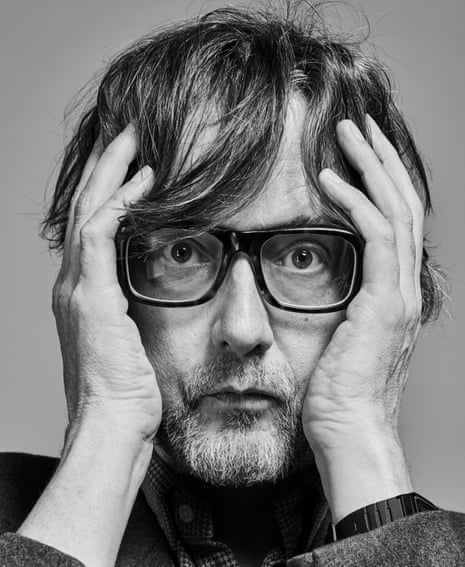
Comments (…)
Sign in or create your Guardian account to join the discussion